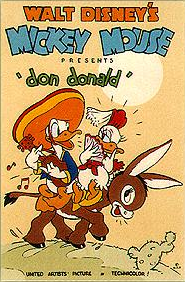| Don Donald | |
|---|---|
 Theatrical release poster | |
| Directed by | Ben Sharpsteen |
| Story by | Webb Smith Otto Englander Merrill De Maris [1] |
| Produced by | Walt Disney |
| Starring | Clarence Nash |
| Music by | Paul J. Smith |
| Animation by | Fred Spencer Dick Huemer Al Eugster Johnny Cannon Milt Schaffer Jack Hannah Ugo D'Orsi [1] |
| Color process | Technicolor |
Production company | |
| Distributed by | United Artists |
Release date |
|
Running time | 8 minutes |
| Country | United States |
| Language | English |
Don Donald is a 1937 American animated short film produced by Walt Disney Productions and released by United Artists. [3] The cartoon follows Donald Duck attempting to woo a female Mexican duck named Donna. It was directed by Ben Sharpsteen and features music by Paul J. Smith which was adapted from the Mexican folk songs "Cielito Lindo" and "Jarabe Tapatío". Clarence Nash voiced both Donald and Donna.
Contents
Although billed at the time as another Mickey Mouse cartoon, explaining the face of Mickey Mouse at the beginning of the original release, the film is actually the first installment of the Donald Duck series, and is the first to feature Donald as the primary starring character. [4] The film also introduces a love interest for Donald.